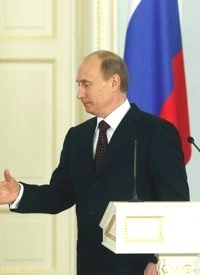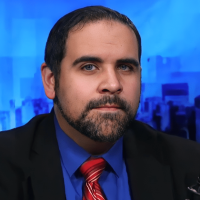
The bear is still in the woods and it is waking up from its 20-year hibernation, as a “new” free-trade zone agreement sets itself to restore the Soviet Union. On December 16, 2010, Reuters reported on what could be described as the resurrection of the former Soviet Union, through the invitation of the Ukraine to join the post-Soviet free-trade zone, or Customs Union, between Russia, Belarus, and Kazakhstan, also known as the Eurasian Customs Union (Customs Union).
According to the report, “Russian Prime Minister Vladimir Putin encouraged Ukraine on Thursday to join Moscow-driven efforts to integrate the economies of the biggest post-Soviet republics into one trading bloc.”
Since the election of Victor Yanukovich as President of Ukraine, in February 2010, the Ukrainian government has increased its ties with Moscow, having signed the Kharkov Agreements in April 2010, which extended the Russian Navy’s lease to use the Sevastopol naval base until at least 2042. President Yanukovich also mothballed Ukraine’s prior proposal to join NATO, much to the relief and pleasure of Russia. These pro-Kremlin moves should come as no surprise to those aware of Yanukovich’s political affiliations.
Although elected as an independent, Yanukovich received the support of Ukraine’s Party of Regions, a pro-Russia party aligned with Russia’s ruling United Russia Party and the Communist Party of China. During his run for Prime Minister in 2006, Yanukovich also received the support and nomination from the Party of Regions, Socialist Party, and the Communist Party of Ukraine (CPU), which remains supportive of him.
The CPU recently expressed its public support of President Yanukovich’s desire to sign the Customs Union Treaty, stating that “Ukraine must return to the traditional neighbors and allies with whom we share not only a common history, and economics,” according to the CPU website (in Russian).
In an attempt to discredit right-wing nationalistic opposition to the Customs Union, the CPU went on to liken it to the European Union, stating:
Take, for example, EU countries, which are already EU delegate its functions: to elect a general president, adopt a common constitution, etc. In this case, the Europeans are not afraid of losing their sovereignty. Therefore, the Communists believe that the Customs Union — a common approach on our way out of economic crisis.
The importance of the Ukraine was best summarized by Soviet General-Secretary Mikhail Gorbachev who, in August 1991, told a Ukrainian journalist: “there can be no Union without Ukraine.”
This view has even been accepted by the Communist Party of Bolivia, in South America, which stated: “Of all of the Soviet republics, the Ukrainian Soviet Socialist Republic was, without a doubt, the most important from all points of view.”
When asked whether Ukraine and Russia should reunite, Putin replied: “In the last 15 years we have seen the first real steps towards integration and the creation of a new union between our three states: Russia, Kazakhstan and Belarus.”
This new Customs Union is characterized as one based on free trade and a common currency, much like the old Soviet Union, of which Putin has described its fall as constituting “the greatest geopolitical catastrophe of the century.” In discussing the Customs Union, Putin reiterated his lament over the fall of the Soviet Union: “He who doesn’t regret the collapse of the Soviet Union has no heart, but he who wants it restored in the original has no brains.”
Putin’s words are suggestive of resurrecting the Soviet Union not exactly as it was originally, but rather as a new larger Soviet Union, built on economic integration and free trade.
The Customs Union agreement between Russia, Belarus, and Kazakhstan was first approved by the State Duma, the lower chamber of Russia’s Federal Assembly, on September 24, 2010 and signed by the respective heads of state on December 9, 2010. According to the 17-document agreement, the Customs Union is to go into effect on January 1, 2012.
“Free flow of goods, services and people and the absence of customs checks — all these will be provided by the union. All in all it’s a new quality of living,” declared Russian President Dmitry Medvedev upon signing the agreement.
Although supported by both Ukrainian President Yanukovich and the CPU, it remains to be seen whether Ukraine will heed the advice of Putin and join the Customs Union.
Communist Vietnam has also expressed an interest in joining the Customs Union, which fits in perfectly with Putin’s vision of establishing a new Soviet Union that is unlike the “original.” Such an integrated economic union would rival the European Union.
20 Trillion Rubles for Rearmament
In addition to the economic revival of the Soviet Union, last week also marked what may be seen as the end to Russia’s weakened military. According to the Global Times, on December 6, 2010, Putin announced that Russia would be “allocating very serious, significant funds for the re-armament program. I am even scared to pronounce this figure: 20 trillion rubles.”
As Putin addressed a crowd of top military brass and reporters at the Sevmash naval shipyard, located in the northern town of Severodvinsk, by the White Sea, he declared about the revitalization of the Russian military: “We need to finally move beyond the years during which the army and the navy were seriously under-financed.”
The “honeymoon,” if there ever was one, between the West and Russia, appears to have come to a close as Russia expands to integrate economically with Belarus and Kazakhstan, and now invites Ukraine. This, coupled with the announcement of an enormous refunding of Russia’s armed forces, seems to fit with the theory elaborated by important Soviet KGB defector Anatoliy Golitsyn in his book New Lies for Old, where he asserts that the alleged “fall” of the Soviet Union was actually a subterfuge to deceive the West. He also predicted that it would re-emerge.
The recent WikiLeaks release of State Department cables that reveal Russian active measures in Tajikistan, its support of Islamic terrorism, involvement in the Russian and Israeli mafias, as well as the recently uncovered espionage operation in London are all indicative of the fact that Russia remains at odds with the United States and the West. The new Customs Union further validates the case that the Kremlin has long since been deceiving the West to believe that it is an ally when in fact its strategic actions suggest otherwise.
Related articles:
WikiLeaks Reveals Russian Active Measures in Tajikistan
WikiLeaks Evidence: Russia Sponsoring Islamic Terror
U.S. Cables: Russian, Israeli Mafias Gaining Power, Infiltrating Governments
Photo: Russian Prime Minister Vladimir Putin and his Kazakh counterpart Karim Masimov (out of picture) shake hands after a meeting of the Supreme Council of the Customs Union of Russia, Belarus and Kazakhstan at the Konstantin’s Palace outside St. Petersburg, Russia, May 28, 2010: AP Images



